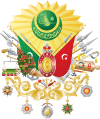Ottoman Liberal People's Party
Ottoman Liberal People's Party | |
|---|---|
| Abbreviation | OHAF |
| Founder | Fethi Okyar |
| Founded | October 19, 1918 |
| Dissolved | May 6, 1919 |
| Split from | Union and Progress Party |
| Newspaper | Minber |
| Ideology | Liberalism |
Ottoman Liberal People's Party (Ottoman Turkish: حریت پرور آوام فرقه سی, romanized: Hürriyetperver Avam Fırkası, lit. 'Libertarian People's Party') was a political party founded during the Armistice period under the leadership of Ali Fethi Bey by state officials and politicians who resigned from the Union and Progress Party following its 1918 congress.[1][2] Mustafa Kemal Pasha was one of its prominent supporters.
Intraparty opposition
[edit]On September 30, 1918, the Committee of Union and Progress convened under the chairmanship of Talaat Pasha. Speaking at this meeting, Ali Fethi Bey said the following:[3]
The Committee of Union and Progress was formed to save the Ottoman Government, which was doomed to ruin. It embarked on a historic mission. It faced many oppositions, bloody reactionaries and unimaginable betrayals. It did not hesitate to fight against misfortunes that could not be resisted. But despite all this; he did not turn away from his historical duty for a moment. Finally; this ominous war was entered. And as soon as we entered the war, many mismanagements started. Mistakes made knowingly or unknowingly by responsible and unaccountable individuals led the country and the nation into the present dire situation... Both the Society and the Party were under the influence of certain individuals. Even today, these influences continue, and the nation and the country are being dragged into the deepest abyss of disaster. This situation must come to an end immediately. Without a moment's delay, we must try to get rid of this catastrophe.
— Ali Fethi Okyar, September 30, 1918 group meeting of the Committee of Union and Progress
This speech caused the opposition within the party to rally around Ali Fethi Bey and laid the foundations of a new party.
At the October 10, 1918 parliamentary meeting, Ali Fethi Bey broke away from the party by running for the chairmanship of the Chamber of Deputies despite the party's decision on Halil Bey, and although he lost in this vote, he received 53 votes.[4]
Foundation
[edit]Liberal People's Party was founded under the leadership of Ali Fethi Bey by civil servants who left the Union and Progress Party during the government of Ahmed Izzet Pasha. There is no exact information about the date of its foundation. On October 19, 1918, it is stated that the party was established in the Parliament. Based on this, it is estimated that the party was founded a few days before.[2] It gained the support of about 30 MPs in the Chamber of Deputies.[5]
Party program
[edit]- On or after November 1, 1918, there was a 94-point party program published in various newspapers in Istanbul.[6]
- While the religion of the state was defined as Islam in Article 1 of the party's program, the freedom of opinion in Article 3 was seen as a liberal step.
- From Article 50 to Article 60, the party's education policy was stated. Private educational institutions were allowed, provided that they were under the supervision of the state, and in addition, the establishment of agricultural and industrial schools was envisioned.[7]
- The party envisaged a production-based economic program and emphasized the importance of road construction and maritime trade.[8]
Parliament and party activities
[edit]OHAF, together with the Renewal Party, took an oppositional stance against the grand vizierate of Ahmet Tevfik Pasha. Both parties were seen as the continuation of the Committee of Union and Progress.[9]
Dissolution
[edit]After the dissolution of the Committee of Union and Progress, the government of Damat Ferid Pasha, which acted against the Unionists, also dissolved the Liberal People's Party with the decision of the Meclis-i Vükelâ dated May 6, 1919. Regarding the closure, it was explained that they were a renamed version of the Committee of Union and Progress and for this reason, it was decided to cancel the party's founding petition.[10]
Although Yozgat MP Şakir Bey tried to re-establish the party in 1919, he failed to achieve results.[10]
References
[edit]- ^ Tunaya, Tarik Zafer (1995). Türkİye'de Sİyasİ Partİler 1859-1952. İkİncİ Baski (in Turkish). İstanbul: Arba Yayinlari. p. 404. OCLC 466402778.
- ^ a b Tunaya, Tarık Zafer (1999). Türkiye'de siyasal partiler. Genişletilmiş baskı (in Turkish). Cağaloğlu, İstanbul: İleteşim Yayınları. p. 91. OCLC 47781102.
- ^ Kocaoğlu, Bünyamin (2003). "İttihat ve Terakki Fırkasının Dağılması - Doktora Tezi" (PDF) (in Turkish). Samsun: Ondokuz Mayıs University. p. 83. Archived from the original (PDF) on 29 January 2023. Retrieved 29 January 2023.
- ^ Akşin, Sina (1988). İstanbul hükümetleri ve Millı̂ Mücadele (in Turkish). İstanbul. p. 35. OCLC 4033975.
{{cite book}}: CS1 maint: location missing publisher (link) - ^ Erik-Jan Zürcher: Kemal, Mustafa (Atatürk), in: 1914-1918-online. International Encyclopedia of the First World War, ed. by Ute Daniel, Peter Gatrell, Oliver Janz, Heather Jones, Jennifer Keene, Alan Kramer, and Bill Nasson, issued by Freie Universität Berlin, Berlin 2024-04-16. DOI: 10.15463/ie1418.11627
- ^ Tunaya, Tarık Zafer (1999). Türkiye'de siyasal partiler. Genişletilmiş baskı (in Turkish). Cağaloğlu, İstanbul: İleteşim Yayınları. p. 95-103. OCLC 47781102.
- ^ Osmanlı Hürriyetperver Avam Fırkası. 1918. pp. 4–5.
- ^ Osmanlı Hürriyetperver Avam Fırkası. 1918. pp. 6–7.
- ^ Zeki, Onur (4 July 2018). "Birinci Türkiye Büyük Millet Meclisi'nde Bağımsız Mebuslar ve Yasama Çalışmaları (1920-1923)" (PDF) (in Turkish). Hacettepe Üniversitesi Atatürk İlkeleri ve İnkılâp Tarihi Enstitüsü Atatürk İlkeleri ve İnkılâp Tarihi Anabilim Dalı. p. 47. Archived from the original (PDF) on 11 July 2019. Retrieved 6 March 2023. kaynağında belirtilen kaynak Kocaoğlu, Bünyamin. Mütarekede İttihatçılık (in Turkish). pp. 95–186.
- ^ a b Tunaya, Tarık Zafer (1999). Türkiye'de siyasal partiler. Genişletilmiş baskı (in Turkish). Cağaloğlu, İstanbul: İleteşim Yayınları. p. 94. OCLC 47781102.

